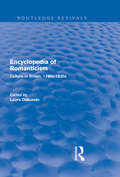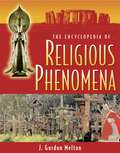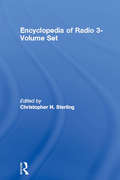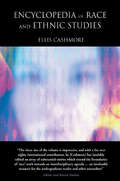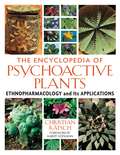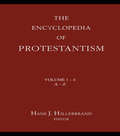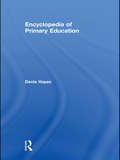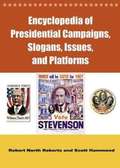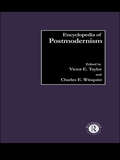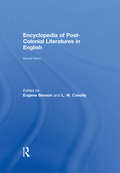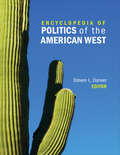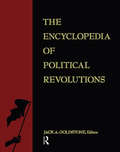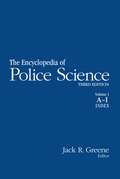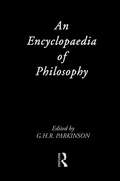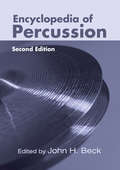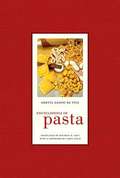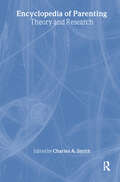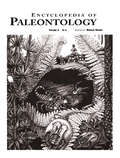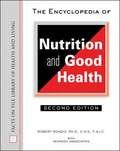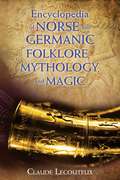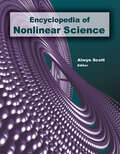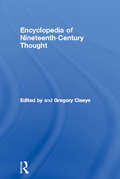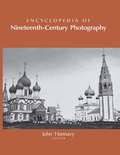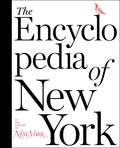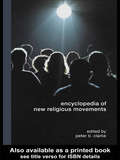- Table View
- List View
Encyclopedia of Romanticism: Culture in Britain, 1780s-1830s (Routledge Revivals)
by Laura DabundoFirst Published in 1992, this encyclopedia is designed to survey the social, cultural and intellectual climate of English Romanticism from approximately the 1780s and the French Revolution to the 1830s and the Reform Bill. Focussing on ‘the spirit of the age’, the book deals with the aesthetic, scientific, socioeconomic – indeed the human – environment in which the Romantics flourished. The books considers poets, playwrights and novelists; critics, editors and booksellers; painters, patrons and architects; as well as ideas, trends, fads, and conventions, the familiar and the newly discovered. The book will be of use for everyone from undergraduate English students, through to thesis-driven graduate students to teaching faculty and scholars.
The Encyclopedia of Religious Phenomena
by J Gordon MeltonFrom sacred mountains and places of pilgrimage to visions and out-of-body travel, this reference explores unusual and unexplained physical events, apparitions, and other phenomena rooted in religious beliefs. Each entry features a balanced presentation and includes a description of the phenomenon, the religious claims surrounding the occurrence, and a scientific response. Touring the world and history, this comprehensive reference includes entries on angels, comets, Marian apparitions, and religious figures such as Jesus, Mohammad, and Lao Tzu.
Encyclopedia of Radio 3-Volume Set
by Michael C. Keith Christopher H. SterlingProduced in association with the Museum of Broadcast Communications in Chicago, the Encyclopedia of Radio includes more than 600 entries covering major countries and regions of the world as well as specific programs and people, networks and organizations, regulation and policies, audience research, and radio's technology. This encyclopedic work will be the first broadly conceived reference source on a medium that is now nearly eighty years old, with essays that provide essential information on the subject as well as comment on the significance of the particular person, organization, or topic being examined.
Encyclopedia of Race and Ethnic Studies
by Ellis CashmoreDeveloped from the critically acclaimed and commercially successful Dictionary of Race and Ethnic Relations, now in its fourth edition, Encyclopedia of Race and Ethnic Studies has been assembled by a world-class team of international scholars led by Ellis Cashmore to provide an authoritative, single-volume reference work on all aspects of race and ethnic studies. From Aboriginal Australians to xenophobia, Nelson Mandela to Richard Wagner, sexuality to racial profiling, the Encyclopedia is organized alphabetically and reflects cultural diversity in a global context. The entries range from succinct 400 word definitions to in-depth 2000 word essays to provide comprehensive coverage of: all the key terms, concepts and debates important figures, both historical and contemporary landmark cases historical events Although unafraid to engage with cutting-edge theory, the Encyclopedia is uncluttered by jargon and has been written in a lucid, 'facts-fronted' style to offer an accessible introduction to race and ethnic studies. The Encyclopedia is also fully cross-referenced and thoroughly indexed with most entries followed by annotated up-to-date suggestions for further reading to guide the user to the key sources. It is destined to become an essential resource for scholars and students of race and ethnic studies, as well as a handy reference for journalists and others working in the field.
The Encyclopedia of Psychoactive Plants: Ethnopharmacology and Its Applications
by Albert Hofmann Christian RätschThe most comprehensive guide to the botany, history, distribution, and cultivation of all known psychoactive plants• Examines 414 psychoactive plants and related substances• Explores how using psychoactive plants in a culturally sanctioned context can produce important insights into the nature of reality• Contains 797 color photographs and 645 black-and-white illustrationsIn the traditions of every culture, plants have been highly valued for their nourishing, healing, and transformative properties. The most powerful plants--those known to transport the human mind into other dimensions of consciousness--have traditionally been regarded as sacred. In The Encyclopedia of Psychoactive Plants Christian Rätsch details the botany, history, distribution, cultivation, and preparation and dosage of more than 400 psychoactive plants. He discusses their ritual and medicinal usage, cultural artifacts made from these plants, and works of art that either represent or have been inspired by them. The author begins with 168 of the most well-known psychoactives--such as cannabis, datura, and papaver--then presents 133 lesser known substances as well as additional plants known as “legal highs,” plants known only from mythological contexts and literature, and plant products that include substances such as ayahuasca, incense, and soma. The text is lavishly illustrated with 797 color photographs--many of which are from the author’s extensive fieldwork around the world--showing the people, ceremonies, and art related to the ritual use of the world’s sacred psychoactives.
Encyclopedia of Protestantism: 4-volume set
by Hans J. HillerbrandFor more information including sample entries, full contents listing, and more, visit the Encyclopedia of Protestantism web site.Routledge is proud to announce the publication of a new major reference work from world-renowned scholar Hans J. Hillerbrand. The Encyclopedia of Protestantism is the definitive reference to the history and beliefs that continue to exert a profound influence on Western thought. Featuring entries written by an international team of specialists and scholars, the encyclopedia traces the course of Protestantism from its beginnings prior to 1517, when Martin Luther nailed his 95 Theses to the door of Wittenberg Cathedral, to the vital and diverse international scene of the present day.
Encyclopedia of Primary Education
by Denis HayesUnique in its field, the Encyclopedia of Primary Education brings together a wide-ranging body of information relating to current educational practice in a single indispensable volume. This book provides a series of descriptions, definitions and explanations that engage with important practical and conceptual ideas in primary education and contains over 500 entries incorporating: Curriculum subjects, themes and topics Theories, policies and educational controversies Pedagogical terms relating to teaching and learning Commentaries on current issues in primary education Influential figures in education, both past and present The impact of educational research on policy and practice Based on the author’s extensive experience in primary education, entries combine an interrogation of educational concepts with the pedagogical and practical implications for classroom practice, children’s learning and school management. This handy reference work will be invaluable to anyone currently teaching or training to teach at primary level, teaching assistants, school governors and parents. In fact it is essential reading for anyone with an interest and passion for primary education.
Encyclopedia of Presidential Campaigns, Slogans, Issues, and Platforms
by Robert North Roberts Scott J. HammondAimed at college undergraduates and high school students, this reference covers the political history of presidential rhetoric and campaigns. The first part of the volume contains chronologically arranged entries describing the course and nature of each presidential campaign since 1789. The second part features longer, general entries discussing broader campaign issues (affirmative action, for example) as well as short entries that focus on a single slogan or phrase (such as "read my lips"). Annotation ©2004 Book News, Inc., Portland, OR (booknews.com)
Encyclopedia of Postmodernism
by Victor E. Taylor Charles E. WinquistThe Encyclopedia of Postmodernism provides comprehensive and authoritative coverage of academic disciplines, critical terms and central figures relating to the vast field of postmodern studies. With three cross-referenced sections, the volume is easily accessible to readers with specialized research agendas and general interests in contemporary cultural, historical, literary and philosophical issues.Since its inception in the 1960s, postmodernism has emerged as a significant cultural, political and intellectual force that many scholars would argue defines our era. Postmodernism, in its various configurations, has consistently challenged concepts of selfhood, knowledge formation, aesthetics, ethics, history and politics. This Encyclopedia offers a wide-range of perspectives on postmodernism that illustrates the plurality of this critical concept that is so much part of our current intellectual debates. In this regard, the volume does not adhere to a single definition of postmodernism as much as it documents the use of the term across a variety of academic and cultural pursuits.The Encyclopedia of Postmodernism, it must be noted, resists simply presenting postmodernism as a new style among many styles occuring in the post-disciplinary academy. Documenting the use of the term acknowledges that postmodernism has a much deeper and long-lasting effect on academic and cultural life. In general, the volume rests on the understanding that postmodernism is not so much a style as it is an on-going process, a process of both disintegration and reformation.
Encyclopedia of Post-Colonial Literatures in English
by L. W. Conolly Eugene BensonPost-Colonial Literatures in English, together with English Literature and American Literature, form one of the three major groupings of literature in English, and, as such, are widely studied around the world. Their significance derives from the richness and variety of experience which they reflect. In three volumes, this Encyclopedia documents the history and development of this body of work and includes original research relating to the literatures of some 50 countries and territories. In more than 1,600 entries written by more than 600 internationally recognized scholars, it explores the effect of the colonial and post-colonial experience on literatures in English worldwide.
Encyclopedia of Politics of the American West
by Dr Steven L. DanverThe Encyclopedia of Politics in the American West is an A to Z reference work on the political development of one of America’s most politically distinct, not to mention its fastest growing, region. This work will cover not only the significant events and actors of Western politics, but also deal with key institutional, historical, environmental, and sociopolitical themes and concepts that are important to more fully understanding the politics of the West over the last century.
The Encyclopedia of Political Revolutions
by Jack A. GoldstoneThe Encyclopedia of Political Revolutions is an important reference work that describes revolutionary events that have affected and often changed the course of history. Suitable for students and interested lay readers yet authoritative enough for scholars, its 200 articles by leading scholars from around the world provide quick answers to specific questions as well as in-depth treatment of events and trends accompanying revolutions. Includes descriptions of specific revolutions, important revolutionary figures, and major revolutionary themes such as communism and socialism, ideology, and nationalism. Illustrative material consists of photographs, detailed maps, and a timeline of revolutions.
Encyclopedia of Police Science: 2-volume set
by Jack R. GreeneIn 1996, Garland published the second edition of the Encyclopedia of Police Science, edited by the late William G. Bailey. The work covered all the major sectors of policing in the US. Since then much research has been done on policing issues, and there have been significant changes in techniques and in the American police system. Technological advances have refined and generated methods of investigation. Political events, such as the terrorist attacks of September 11, 2001 in the United States, have created new policing needs while affecting public opinion about law enforcement. These developments appear in the third, expanded edition of the Encyclopedia of Police Science. 380 entries examine the theoretical and practical aspects of law enforcement, discussing past and present practices. The added coverage makes the Encyclopedia more comprehensive with a greater focus on today's policing issues. Also added are themes such as accountability, the culture of police, and the legal framework that affects police decision. New topics discuss recent issues, such as Internet and crime, international terrorism, airport safety, or racial profiling. Entries are contributed by scholars as well as experts working in police departments, crime labs, and various fields of policing.
An Encyclopedia of Philosophy (Routledge Companion Encyclopedias)
by G.H.R. Parkinson* Presents a broad survey of philosophical thought* Each chapter explores, and places in context, a major area of philosophical enquiry - including the theory of meaning and of truth, the theory of knowledge, the philosophies of mathematics, science and metaphysics, the philosophy of mind, moral and political philosophy, aesthetics, and religion* Annotated bibliographies for each chapter and indexes of names and subjects * Glossary of commonly-used philosophical terms* Chronological table of the history of philosophy from 1600`It is a fine achievement and deserves the warmest praise ... Anyone interested in learning what contemporary philosophical debate is about will find this book invaluable ... for a book of this size and quality of content the cover price is modest. Every public library as well as every university, college and school library should have a copy on its shelves.' - Times Higher Education Supplement`A stimulating collection.' - Reference Reviews
Encyclopedia of Percussion
by John H. BeckThe Encyclopedia of Percussion is an extensive guide to percussion instruments, organized for research as well as general knowledge. Focusing on idiophones and membranophones, it covers in detail both Western and non-Western percussive instruments. These include not only instruments whose usual sound is produced percussively (like snare drums and triangles), but those whose usual sound is produced concussively (like castanets and claves) or by friction (like the cuíca and the lion’s roar). The expertise of contributors have been used to produce a wide-ranging list of percussion topics. The volume includes: (1) an alphabetical listing of percussion instruments and terms from around the world; (2) an extensive section of illustrations of percussion instruments; (3) thirty-five articles covering topics from Basel drumming to the xylophone; (4) a list of percussion symbols; (5) a table of percussion instruments and terms in English, French, German, and Italian; and (6) an updated section of published writings on methods for percussion.
Encyclopedia of Pasta
by Darra GoldsteinThis book is about traditional Italian pasta -- the long, the short, the layered, the rolled, the stretched, and the stuffed, a unique Italian heritage.
Encyclopedia of Parenting: Theory and Research
by Charles A. SmithParenting receives growing amounts of attention from researchers, and what was once considered chiefly an art is now also recognized for being a science. Our knowledge of parenting has increased significantly in the last few decades; new developments continue to happen daily. The Encyclopedia of Parenting provides, in reference book format, what we now know about parents, parenting, and the parent-child relationship, synthesized in some 250 alphabetically arranged entries. Each entry is written by an expert contributor and provides an authoritative overview of a particular topic. Subjects covered include: child activity; child outcomes; child states; parent behaviours; parental situations; external and community factors; systematic concerns; the transition to parenthood; available resources; persons who have added to our knowledge of the field. Entries draw on a wide range of disciplines, including psychology, education, and sociology. Each entry closes with a bibliography, and the volume concludes with a selected list of works for further reading.
Encyclopedia of Paleontology
by Ronald SingerFirst Published in 2000. Routledge is an imprint of Taylor & Francis, an informa company.
The Encyclopedia of Nutrition and Good Health (2nd edition)
by Robert RonzioSome 2,500 entries on nutrition and maintaining a healthy diet are presented in this reference for general readers and students. Coverage includes vitamins and fats, the benefits and dangers of various foods, diseases related to nutrition, and the link between certain foods and cancer. This edition contains about 30% new material, reflecting the latest work in the field and revised government guidelines, and includes new appendices. Ronzio holds an honorary doctor of naturopathic medicine degree from Bastyr University.
Encyclopedia of Norse and Germanic Folklore, Mythology, and Magic
by Claude LecouteuxA thorough reference to the many deities, magical beings, mythical places, and ancient customs of the Norse and Germanic regions of Europe • Explores the legends and origins of well-known gods and figures such as Odin, Thor, Krampus, and the Valkyries, as well as a broad range of magical beings such as the Elf King, the Lorelei, the Perchten, dwarves, trolls, and giants • Draws upon a wealth of well-known and rare sources, such as the Poetic Edda and The Deeds of the Danes by Saxo Grammaticus • Examines folktales, myths, and magical beliefs from Germany, Austria, Switzerland, Denmark, Finland, Sweden, Norway, Iceland, and England The legends of the Norse and Germanic regions of Europe--spanning from Germany and Austria across Scandinavia to Iceland and England--include a broad range of mythical characters and places, from Odin and Thor, to berserkers and Valhalla, to the Valkyries and Krampus. In this encyclopedia, Claude Lecouteux explores the origins, connections, and tales behind many gods, goddesses, magical beings, rituals, folk customs, and mythical places of Norse and Germanic tradition. More than a reference to the Aesir and the Vanir pantheons, this encyclopedia draws upon a wealth of well-known and rare sources, such as the Poetic Edda, the Saga of Ynglingar by Snorri Sturluson, and The Deeds of the Danes by Saxo Grammaticus. Beyond the famous and infamous Norse gods and goddesses, Lecouteux also provides information on lesser-known figures from ancient Germanic pagan tradition such as the Elf King, the Lorelei, the Perchten, land spirits, fairies, dwarves, trolls, goblins, bogeymen, giants, and many other beings who roam the wild, as well as lengthy articles on well-known figures and events such as Siegfried (Sigurd in Norse) and Ragnarök. The author describes the worship of the elements and trees, details many magical rituals, and shares wild folktales from ancient Europe, such as the strange adventure of Peter Schlemihl and the tale of the Cursed Huntsman. He also dispels the false beliefs that have arisen from the Nazi hijacking of Germanic mythology and from its longtime suppression by Christianity. Complete with rare illustrations and information from obscure sources appearing for the first time in English, this detailed reference work represents an excellent resource for scholars and those seeking to reconnect to their pagan pasts and restore the old religion.
Encyclopedia of Nonlinear Science
by Alwyn ScottIn 438 alphabetically-arranged essays, this work provides a useful overview of the core mathematical background for nonlinear science, as well as its applications to key problems in ecology and biological systems, chemical reaction-diffusion problems, geophysics, economics, electrical and mechanical oscillations in engineering systems, lasers and nonlinear optics, fluid mechanics and turbulence, and condensed matter physics, among others.
Encyclopedia of Nineteenth Century Thought
by Gregory ClaeysEncyclopedia of Nineteenth Century Thought provides essential information on, and a critical interpretation of, nineteenth-century thought and nineteenth-century thinkers. The project takes as its temporal boundary the period 1789 to 1914. Encyclopedia of Nineteenth Century Thought primarily covers social and political thinking, but key entries also survey science, religion, law, art, concepts of modernity, the body and health, and so on, and thereby take into account all of the key developments in the intellectual history of the period. The encyclopedia is alphabetically organized, and consists of:* principal entries, divided into ideas (4000 words) and persons (2500 words)* subsidiary entries of 1000 words, which are entirely biographical* informational entries of 500 words, which are also biographical.
Encyclopedia of Nineteenth-Century Photography
by John HannavyThe Encyclopedia of Nineteenth-Century Photography is the first comprehensive encyclopedia of world photography up to the beginning of the twentieth century. It sets out to be the standard, definitive reference work on the subject for years to come. Its coverage is global – an important ‘first’ in that authorities from all over the world have contributed their expertise and scholarship towards making this a truly comprehensive publication. The Encyclopedia presents new and ground-breaking research alongside accounts of the major established figures in the nineteenth century arena. Coverage includes all the key people, processes, equipment, movements, styles, debates and groupings which helped photography develop from being ‘a solution in search of a problem’ when first invented, to the essential communication tool, creative medium, and recorder of everyday life which it had become by the dawn of the twentieth century. The sheer breadth of coverage in the 1200 essays makes the Encyclopedia of Nineteenth-Century Photography an essential reference source for academics, students, researchers and libraries worldwide.
The Encyclopedia of New York
by The Editors of New York MagazineThe must-have guide to pop culture, history, and world-changing ideas that started in New York City, from the magazine at the center of it all. Since its founding in 1624, New York City has been a place that creates things. What began as a trading post for beaver pelts soon transformed into a hub of technological, social, and cultural innovation—but beyond fostering literal inventions like the elevator (inside Cooper Union in 1853), Q-tips (by Polish immigrant Leo Gerstenzang in 1923), General Tso&’s chicken (reimagined for American tastes in the 1970s by one of its Hunanese creators), the singles bar (1965 on the Upper East Side), and Scrabble (1931 in Jackson Heights), the city has given birth to or perfected idioms, forms, and ways of thinking that have changed the world, from Abstract Expressionism to Broadway, baseball to hip-hop, news blogs to neoconservatism to the concept of &“downtown.&” Those creations and more are all collected in The Encyclopedia of New York, an A-to-Z compendium of unexpected origin stories, hidden histories, and useful guides to the greatest city in the world, compiled by the editors of New York Magazine (a city invention itself, since 1968) and featuring contributions from Rebecca Traister, Jerry Saltz, Frank Rich, Jonathan Chait, Rhonda Garelick, Kathryn VanArendonk, Christopher Bonanos, and more. Here you will find something fascinating and uniquely New York on every page: a history of the city&’s skyline, accompanied by a tour guide&’s list of the best things about every observation deck; the development of positive thinking and punk music; appreciations of seltzer and alternate-side-of-the-street parking; the oddest object to be found at Ripley&’s Believe It or Not!; musical theater next to muckracking and mugging; and the unbelievable revelation that English muffins were created on...West Twentieth Street. Whether you are a lifelong resident, a curious newcomer, or an armchair traveler, this is the guidebook you&’ll need, straight from the people who know New York best.
Encyclopedia of New Religious Movements
by Peter B. ClarkeNew Religious Movements (NRMs) can involve vast numbers of followers and in many cases are radically changing the way people understand and practice religion and spirituality. Moreover, many are having a profound impact on the form and content of mainstream religion. The Encyclopedia of New Religious Movements provides uniquely global coverage of the phenomenon, with entries on over three-hundred movement from almost every country in the world. Coverage includes movements that derive from the major religions of the world and to neo-traditional movements, movements often overlooked in the study of NRMs. In addition to the coverage of particular movements there are also entries on topics, themes, key thinkers and key ideas, for example the New Age Movement, Neo-Paganism, New Religion and gender, NRMs and cyberspace, NRMs and the law, the Anti-Cult Movement, Swedenborg, Jung, Teilhard de Chardin, Lovelock, Gurdjieff, al-Banna, Qutb. The marked global approach and comprehensiveness of the encyclopedia enable an appreciation of the innovative energy of NRMs, of their extraordinary diversity, and the often surprising ways in which they can propagate geographically. The most ambitions publication of its sort, the Encyclopedia of New Religious Movements is a major addition to the reference literature for students and researchers of the field in religious studies and the social sciences. Entries are cross-referenced with short bibliographies for further reading. There is a full index.
